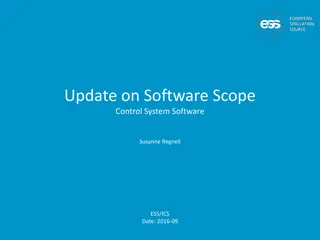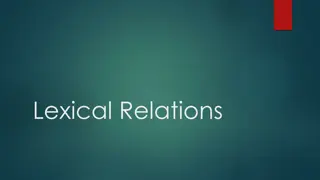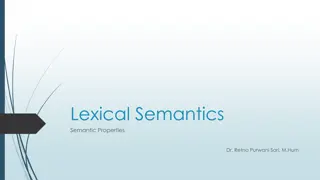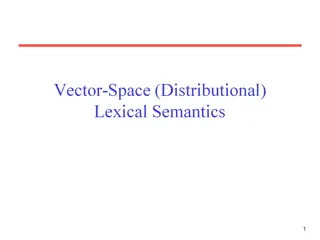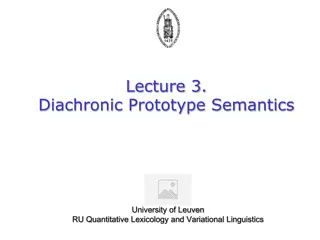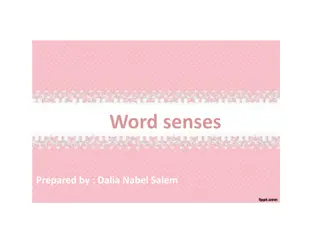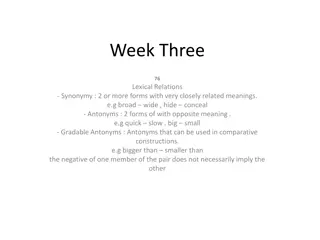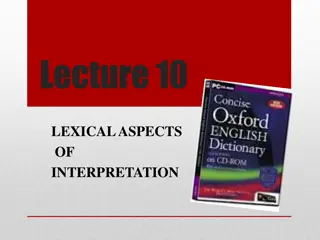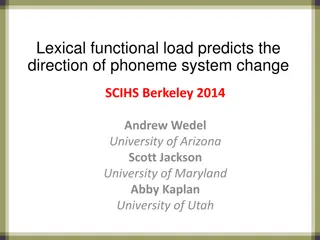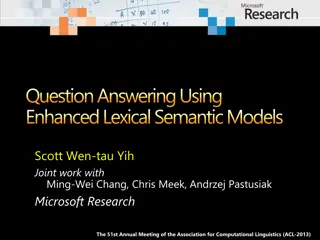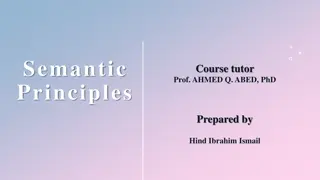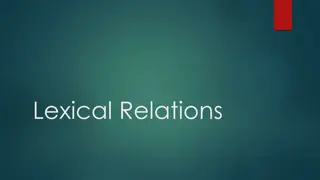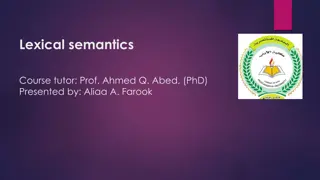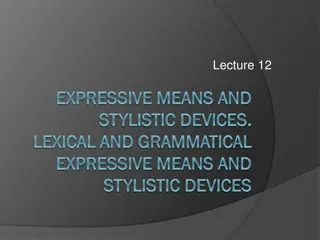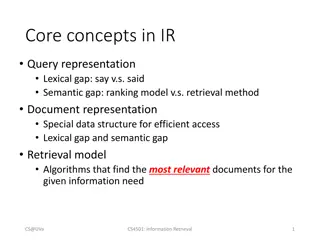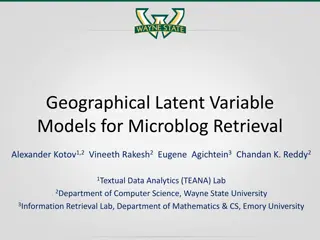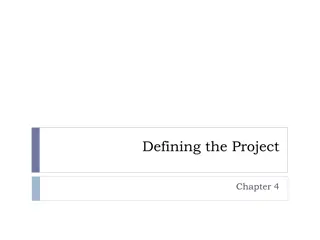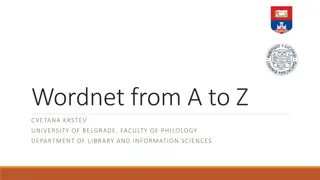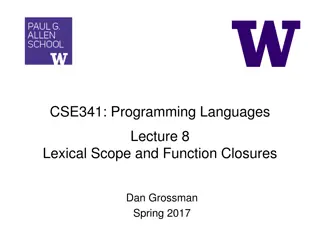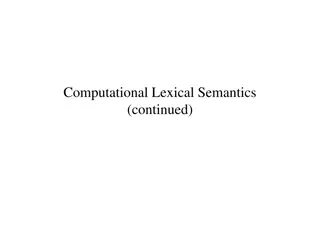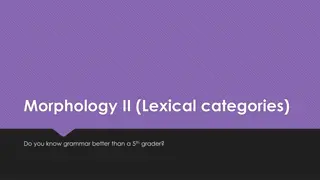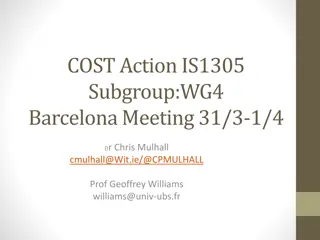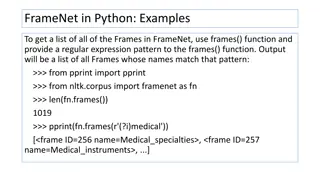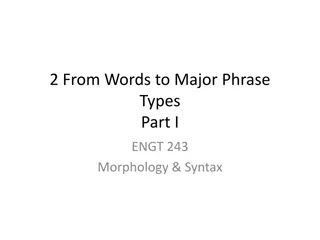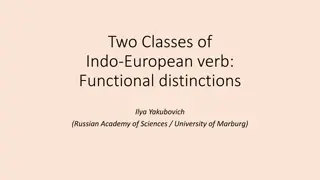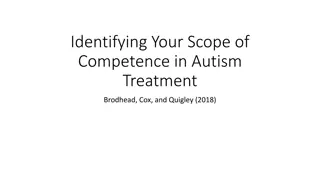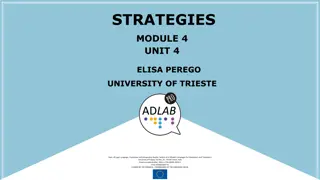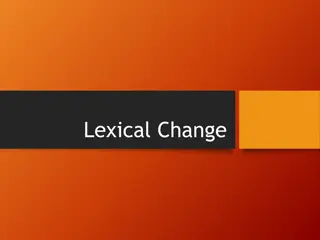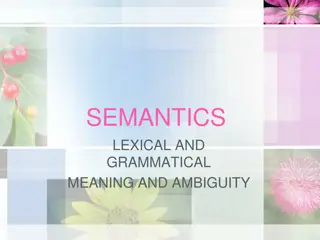International Marketing: Nature, Scope, and Importance
Explore the meaning of international marketing, its scope, and why it is important, as well as the nature of international marketing. Learn about the challenges, risks, and competition involved, and discover the broad market available. Additionally, understand the scope of international marketing, i
189 views • 34 slides
Understanding Semasiology: The Study of Word Meaning
Semasiology is a branch of linguistics focused on the meaning of words. It delves into various aspects of lexical meaning, semantic development, polysemy, and semantic structure. Through exploring types of word meanings and semantic changes, semasiology helps us comprehend the intricate nuances of l
4 views • 19 slides
Update on Control System Software Scope by Susanne Regnell at ESS/ICS
The update discusses the current status, ongoing recruitments, and prioritizations of software scope at ESS/ICS. It highlights the software roadmap, in-kind partnerships, and challenges faced in integration and maintenance of various applications like Naming Server and Controls Configuration Databas
1 views • 14 slides
Understanding Lexical Relations: Synonyms, Antonyms, Hyponymy, and Prototype
Explore the concepts of synonyms, antonyms, hyponymy, and prototype in lexical relations. Learn how closely related words can be substituted for each other, understand opposites, inclusion in meanings, and characteristic instances in word categories.
0 views • 12 slides
Understanding Predicators and Predicates in Sentence Semantics
Exploring the semantics of sentences, this content delves into the structure of declarative sentences in terms of predicators and arguments. It discusses various classes of items that can function as the predicator of a sentence, such as lexical verbs, the copulative verb "be" in equative sentences,
1 views • 39 slides
Understanding Lexical Density in Text Analysis
Explore the concept of lexical density by analyzing the proportion of content words in a text. Learn how lexical density impacts clarity and interpretation using examples with varying levels of lexical density. Gain insights into the significance of lexical words and how they contribute to the meani
5 views • 34 slides
Understanding Semantic Properties in Lexical Semantics
Explore the concept of semantic properties in lexical semantics through examples involving word meanings and relationships. Learn how semantic properties form the basic building blocks of language construction, sharing common attributes among words while also showing contrastive distinctions. Dive i
0 views • 17 slides
Understanding Word Meaning through Vector Space Models
Explore how Vector-Space (Distributional) Lexical Semantics represent word meanings as points in a high-dimensional space. Learn about Semantic similarity, creating sample lexical vector spaces, and using word vectors to measure semantic relatedness. Discover how other contextual features and featur
0 views • 33 slides
Evolution of Lexical Categories: A Cognitive Sociolinguistics Perspective
The lecture series at the University of Leuven explores Diachronic Prototype Semantics and its implications for Variational Linguistics. It delves into semasiological, conceptual onomasiological, and formal onomasiological variation in linguistic meaning, emphasizing the role of variability in the e
1 views • 67 slides
Understanding Changes in Aspect: Workshop Highlights by Elly van Gelderen
Explore the systematic changes in verb meaning due to aspect and theta-roles, the influence of lexical and grammatical aspect on each other, and the significance of telic, durative, and stative aspects in language. Discover insights on children's early awareness of aspectual verb classes and their c
0 views • 77 slides
Understanding Polysemy and Homonymy in Lexical Ambiguity
In lexical ambiguity, polysemy refers to one word having multiple related senses, while homonymy involves different words that sound the same but have unrelated meanings. Distinguishing between polysemy and homonymy can be challenging, but certain guidelines can help differentiate them based on shar
0 views • 27 slides
Understanding Lexical Relations in Linguistics
Different types of lexical relations such as synonymy, antonyms, hyponymy, homophony, and homonymy play a crucial role in understanding the nuances of language. Synonyms have closely related meanings, antonyms have opposite meanings, while hyponymy and hypernymy show hierarchical relationships betwe
0 views • 4 slides
Lexical Aspects of Interpretation: Focuses of Meaning
This discussion explores the concept of "focuses of meaning" in interpretation, emphasizing how interpreters memorize and reconstruct oral messages around key elements such as subject field terms, set phrases, and precision lexicon. The necessity of understanding terminology in various subject field
0 views • 28 slides
Understanding Word Meaning in Lexical Semantics
Introduction to Chapter 5 Lecture 4.1 discusses the nature of word meaning, major problems of lexical semantics, and different approaches. It explains the concept of a word, prototypical words, lexical roots, lexemes, and word forms, highlighting the importance of the word as a lexeme in lexical sem
1 views • 20 slides
The Influence of Lexical Functional Load on Phoneme System Changes
The study explores how the functional load of phoneme contrasts affects the trajectory of phoneme system changes over time. Researchers examine phoneme mergers in nine languages, finding an inverse correlation between the number of minimal pairs and mergers. The model is refined to investigate diffe
2 views • 26 slides
Enhanced Lexical Semantic Models for Question Answering - ACL 2013 Study
Utilizing enhanced lexical semantic models, this study presents approaches for sentence selection in question answering tasks, emphasizing tree-based techniques like tree edit-distance and quasi-synchronous grammar to match dependency trees. It discusses challenges in dependency tree matching, compu
0 views • 34 slides
Understanding Language Principles: Semantic and Syntactic Analysis
Language users rely on semantic principles like open choice and idiom to understand utterances, while syntactic analysis helps in grasping sentence structure. The interplay between lexical and phraseological features shapes language comprehension, showcasing tensions like in aspectual and idiomatic
0 views • 16 slides
Building interactive interpreter for Calculator Language with REPL, Parsing, and Lexical Analysis
This project involves creating a user interface similar to a Read-Eval-Print Loop (REPL) for programming languages. Users can input text representations of expressions, which are then parsed, evaluated, and errors are handled accordingly before displaying the expression's value. Additionally, the st
0 views • 22 slides
Understanding Lexical Relations in Language
Explore the concepts of synonymy, antonymy, hyponymy, and prototype in linguistics. Learn about words with closely related meanings (synonyms), opposite meanings (antonyms), inclusive meanings (hyponyms), and characteristic examples (prototypes) within lexical relations.
0 views • 12 slides
Understanding Lexical Semantics: An Overview
Lexical semantics explores the relationships words have with each other and with our understanding of reality. It delves into reference and sense, naming theory, synonymy, and more. Reference focuses on how words relate to objects, while sense deals with relationships between lexical items. Naming t
0 views • 10 slides
Understanding Lexical and Grammatical Expressive Means in Stylistic Devices
The lecture discusses various lexical and grammatical expressive means in stylistic devices, such as metaphor, personification, allusion, metonymy, synecdoche, irony, epithet, and oxymoron. These tools allow for creative and vivid expressions in language by playing with different meanings and associ
0 views • 22 slides
Understanding Core Concepts in Information Retrieval: Lexical and Semantic Gaps, Retrieval Models, and Algorithms
Explore the core concepts in Information Retrieval (IR) including lexical gaps like 'say' vs. 'said', semantic gaps, ranking models vs. retrieval methods, special data structures for efficient access, and algorithms for finding relevant documents. Understand the differences between IR and databases,
0 views • 46 slides
Geographical Latent Variable Models for Microblog Retrieval
Addressing challenges in microblog retrieval such as vocabulary mismatch and multi-faceted relevance signals. Explore opportunities in leveraging lexical and non-lexical information, including geographical meta-data. Discuss prior work on utilizing timestamps and re-tweets, while also highlighting t
0 views • 19 slides
Defining the Project: Scope, Priorities, and Structure
This chapter focuses on the critical steps involved in defining a project, including establishing project scope, priorities, and creating a work breakdown structure. It covers the importance of clear scope definition, managing project trade-offs, and structuring project tasks effectively. Additional
0 views • 26 slides
Overview of WordNet: History, Definition, Authors, and Usage
WordNet is a lexical database for the English language, grouping words into synonym sets, providing definitions, and recording relations among these sets. It serves as a dictionary and thesaurus, with primary use in text analysis and AI. Created at Princeton University under George Miller and direct
0 views • 59 slides
Understanding Lexical Scope and Function Closures in Programming Languages
Lexical scope allows functions to access bindings where they were defined, not where they were called. Function closures enable functions to be evaluated in old environments, even when those environments aren't available anymore. This concept is crucial for homework, exams, and competent programming
0 views • 20 slides
Integrating Lexical Features and Language Tools into FutureLearn Platform by Jemma König
Explore the integration of lexical features and language tools into the FutureLearn platform as presented by Jemma König from the University of Waikato. Discover how F-Lingo enhances learning through identifying key words, phrases, and concepts in the text, providing definitions, example sentences,
0 views • 7 slides
Understanding Word Sense Disambiguation in Computational Lexical Semantics
Word Sense Disambiguation (WSD) is a crucial task in Computational Lexical Semantics, aiming to determine the correct sense of a word in context from a fixed inventory of potential word senses. This process involves various techniques such as supervised machine learning, unsupervised methods, thesau
0 views • 67 slides
Understanding Word Sense Disambiguation in Computational Lexical Semantics
Explore the intricate world of word sense disambiguation in computational lexical semantics, covering supervised and unsupervised techniques, lexical sample and all-words tasks, and various approaches such as knowledge-based and machine learning. Delve into the complexities of interpreting different
0 views • 94 slides
Understanding Lexical Categories in Morphology
Explore the world of lexical categories, morphology, and affixes to enhance your grasp of grammar concepts. Dive into the definitions of nouns, verbs, adjectives, prepositions, pronouns, articles, conjunctions, and adverbs. Learn about affixes such as prefixes, suffixes, infixes, and circumfixes, an
0 views • 12 slides
Exploring Lexical Variation in Landscape Descriptions
Focused on studying lexical variation in landscape descriptions, this subgroup aims to enhance coordination, develop specific actions, and seek technical solutions within WG4. By analyzing words related to landscape, colors, and emotions, the group investigates conventionalized changes, lexically di
0 views • 22 slides
Working with FrameNet in Python
Examples provided demonstrate how to access FrameNet data in Python using functions like frames(), frame(), lus(), and lu(). You can search for specific frames, get details of individual frames, lexical units, and roles in FrameNet. The content showcases how to retrieve information on medical frames
0 views • 12 slides
Understanding Syntax and Lexical Categories in English Grammar
Syntax is the study of rules in generating grammatical sentences, focusing on building grammars that produce well-formed English sentences. It involves organizing words into categories like nouns, verbs, adjectives, and adverbs to form phrases and clauses. Lexical categories are determined based on
0 views • 33 slides
Understanding Homonymy in Lexical Semantics: Examples from English and Arabic
Explore the concept of homonymy in lexical semantics through examples in both English and Arabic languages. Homonymy refers to words that share the same form but have unrelated meanings, leading to ambiguity in communication. Examples of homonyms in English and Arabic showcase how words can have mul
0 views • 27 slides
Understanding Lexical Relations in Language
Lexical relations play a crucial role in understanding the meanings of words in any language. They encompass relationships like entailment, paraphrase, and contradiction, shedding light on how lexemes are interconnected. Additionally, lexical fields and kinship systems offer further insights into ho
0 views • 10 slides
Functional and Lexical Distribution of Indo-European Verbs
Investigating the functional and lexical distribution of Indo-European verb classes, this research delves into the mi- and xa-conjugations in Proto-Indo-European, new discoveries in the preterit of the xa-conjugation, paradigms in Hittite, perfect and middle endings in Late Indo-European, and the ch
0 views • 18 slides
Understanding Scope of Competence in Autism Treatment
Exploring the importance of practicing within one's scope of competence in autism treatment. Discusses how to identify and broaden your scope, when to seek further training or refer a client. Highlights the negative outcomes of practicing outside your competence and the scope of competence within th
0 views • 30 slides
Effective Strategies for Creating Engaging Advertisements
Discover effective strategies for formulating engaging advertisements, such as observational skills, writing skills, and concise language use. Explore the use of meticulous, visually intense, and usable content to captivate audiences in the realm of visual arts and museum advertisements. Learn about
0 views • 17 slides
Exploring the Origins of Words: A Dive into Lexical Change
Dive into the origins of words with a discussion on lexical change, examining terms like iPod, Jedward, Fries, and more. Explore key concepts like derivation, compounding, blending, clipping, and coinage to understand how language evolves over time through various processes.
0 views • 7 slides
Understanding Semantics, Lexical, and Grammatical Meaning
Exploring the nuances of semantics, lexical meaning, and grammatical meaning, this content delves into the distinctions between them, the role of lexemes, and the complexities associated with words. It discusses the various kinds of meanings expressed at the lexical and grammatical levels, including
1 views • 37 slides


